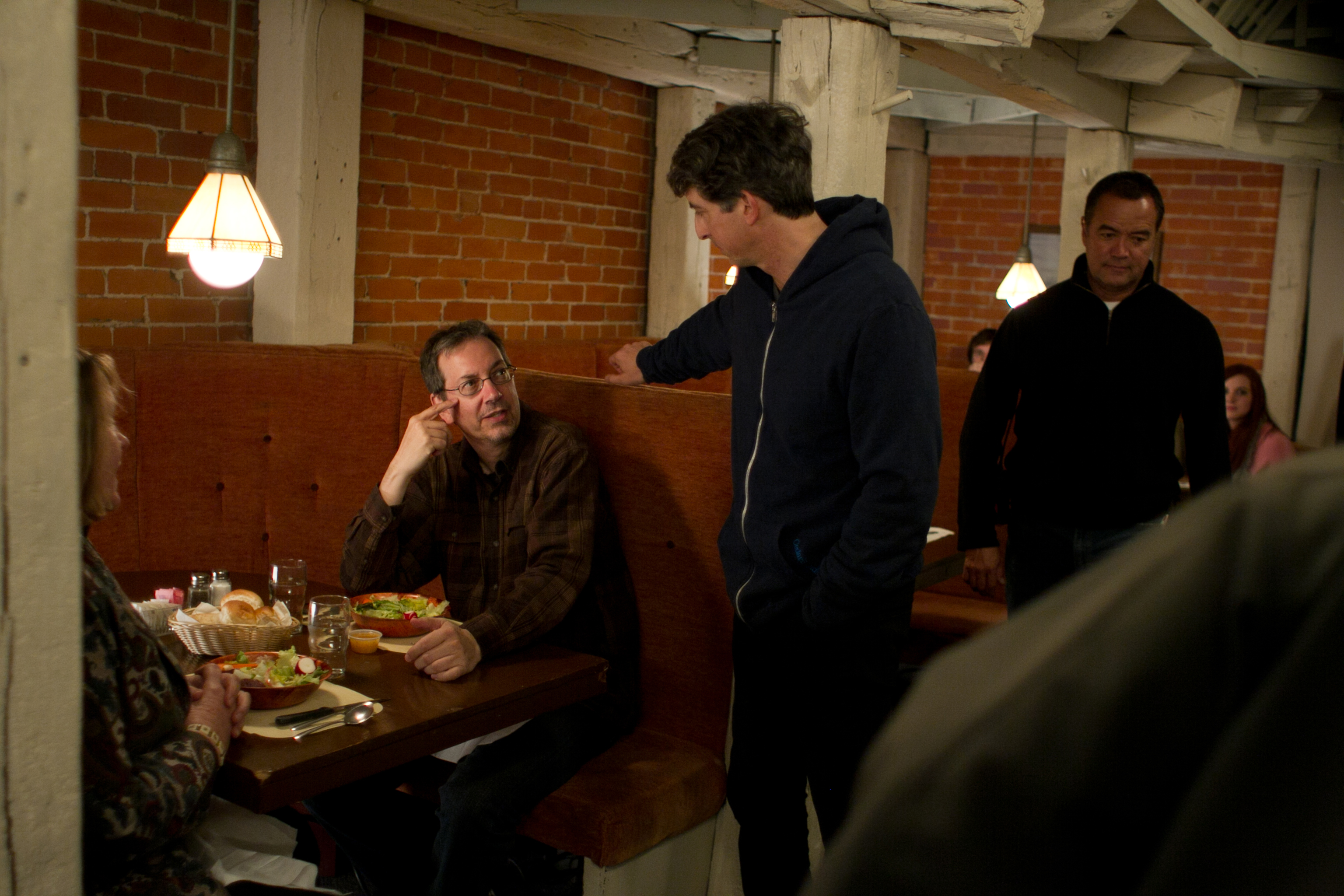For Seattle TV viewers of a certain age—or any age, if you go to YouTube—there is the memory of Uncle Fran’s Musical Forest, in which the depressive, guitar-playing host of a children’s television program kept getting interrupted by a surly raccoon hand-puppet (rather like Triumph the Insult Dog before his day). Fran, played by writer/performer Bob Nelson during the final decade of KING TV’s Almost Live! (1984–99), had some anger-management issues, but they were generally displaced into jolly sing-along tunes. (Sample: “Do ya know what fear is, kids, do ya? Well, you will someday as your dreams fade away, or become roadkill on God’s highway.”)
John Keister and Nancy Guppy may now be the most locally prominent among Almost Live! ’s alumni, and Joel McHale is certainly the most famous nationally, but the ever-self-doubting and -deprecating Nelson is finally getting his due. As we meet for coffee at an Eastlake bakery, he sounds almost sheepish about his good fortune. (And his talent; let me say what he won’t.) Nebraska, written a decade ago, is now one of the best-reviewed movies of the holiday season, with various awards likely for him, director Alexander Payne, and star Bruce Dern. (All three are nominated for Golden Globes.)
After winning Dern the Best Actor prize at Cannes (which Nelson attended), the movie opened here at Thanksgiving. In it, the old, ex-alcoholic Woody (Dern) seizes onto the grail of a $1 million sweepstakes letter. Driving from Montana to the Nebraska sweepstakes office, Woody’s son (Will Forte) indulges his dour dad, who gradually reveals more of his hard-luck past when they stop in Woody’s old hometown, where comic misadventures also ensue.
As a young man, Nelson hosted a UW radio show, writing and performing comedy bits; but as for a career in showbiz, “I didn’t think I was good enough.” Later working in the ad department of The Seattle Times and pushing 30, “I wrote up a package [of comedy sketches] and I walked over there [to KING 5] on my lunch hour, and I left it there, and I ran away.” Almost Live! hired him the following season, but “I was kind of dragged into performing. Playing dumb is easy. I can do deadpan.” On such a shoestring local show, writers had to perform—hence Uncle Fran and other characters. Then, with Almost Live! ending, Nelson says “there was a panic” about what to do next.
He wrote for Bill Nye and The John Report following Almost Live!, then his Nebraska script found its way to Payne’s partners. “They called right away and optioned it,” he recalls. In 2003, “Payne called up and said, ‘I’d like to do it.’ We knew it would be a long way, but the great thing is that he kept his promise.” After catching such a break with an Oscar-winning writer and director (Election, Sideways, The Descendants, etc.), he remembers his friends telling him, “That never happens like that. You know how lucky you are?”
Ten years later, it’s sunk in. That first sale got him an agent and regular screenwriting gigs, Nelson explains, which he can do from his Whidbey Island home—with occasional visits to L.A.
Nebraska has its origins in the road trips Nelson and family would make from Kent to see cousins in Nebraska. “My relatives had very dry, deadpan senses of humor,” he recalls. “That’s where my sense of humor came from—like Bob Newhart’s, quieter and more observational.” But even in the ’70s, there was an awareness of hard times hitting the Great Plains. “I would see those abandoned farms and I’d ask, ‘What happened?’ The small farms, they got bought out.”
Though Nelson’s script was written before the recession, the movie reflects the long-brewing economic forces that led to it. Woody and family are barely middle-class back in Montana, and he’s clearly a child of the Great Depression. However delusional he is about that sweepstakes letter, it contains the enthralling possibility of transformation, of respect.
Woody also has roots in his family, explains Nelson. “Dad was a nice guy, and he tended to drink, and people stole his tools and his air compressor. When he went to buy a car, it always had to be 10 years old.” Though Woody’s quest is partly comic, there’s the genuine urge toward validation, “to drive a brand-new truck and have your buddies admire it.”
And after struggling for decades as a writer, Nelson can relate: “I didn’t buy my own first new car until three years ago.” Now, too, there’s the validation of seeing Nebraska on the marquee of the Guild 45th Theatre, where Nelson remembers watching Woody Allen movies during the ’80s as a lost young guy wondering what to do after college. “I always wanted to write a book or a movie,” says Nelson, “but I never thought I was good enough.”
bmiller@seattleweekly.com








